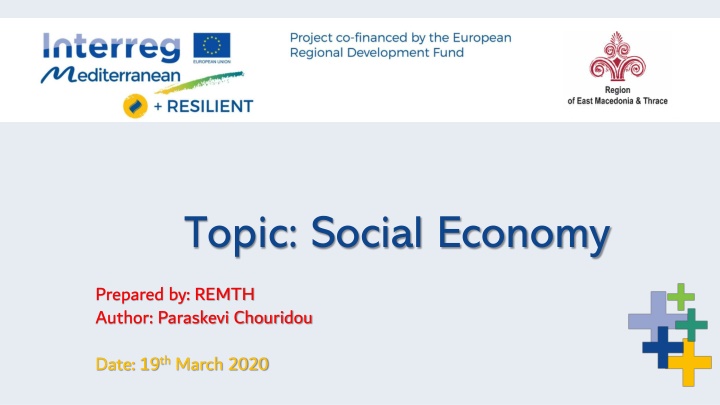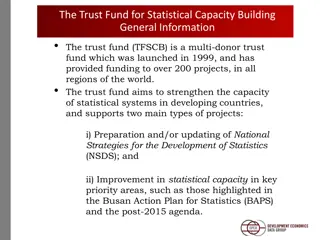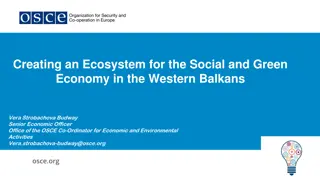
Capacity Building in Social Economy
The training material focuses on increasing skills and knowledge for social economy organizations and entrepreneurs, aiming to enhance performance and understanding of social economy frameworks at the European level. Covering topics such as defining social economy, social impact, and social innovation, this resource is designed to support stakeholders in strengthening their capacity for sustainable social entrepreneurship.
Uploaded on | 0 Views
Download Presentation

Please find below an Image/Link to download the presentation.
The content on the website is provided AS IS for your information and personal use only. It may not be sold, licensed, or shared on other websites without obtaining consent from the author. If you encounter any issues during the download, it is possible that the publisher has removed the file from their server.
You are allowed to download the files provided on this website for personal or commercial use, subject to the condition that they are used lawfully. All files are the property of their respective owners.
The content on the website is provided AS IS for your information and personal use only. It may not be sold, licensed, or shared on other websites without obtaining consent from the author.
E N D
Presentation Transcript
Topic: Social Economy Prepared by: REMTH Author: Paraskevi Chouridou Date: 19thMarch 2020
License This training material is licensed under a Creative Commons Attribution-NonCommercial-Share.
Funding The training material has been developed by Region of East Macedonia & Thrace (REMTH) with the technical support of Aix-Marseil le University (AMU) within the framework of the project +RESILIENT The project is co-financed by the MED Programme.
INTRODUCTION The training material for transferring actions of +RESILIENT project is focused on the development of 4 training topics. The training material of the topics will be used to the transferring phase of the project and will have as a purpose to assist the stakeholders, who will participate in the pilot actions in local level, to reinforce and build their capacity. This training topic focuses on Capacity building on issues related to social economy and existing frameworks on European level.
INTRODUCTION The objective of the topic is to increase skills and knowledge needed by social economy organizations members and social entrepreneurs to do the job done and perform better as well as acquire a better knowledge of the social economy. The topic is designed also for people already running social enterprises and social economy organizations or intending to create new ones.
CONTENTS Section 1: Defining social economy Section 2: Enterprises and organizations of Social economy Section 3: Social economy in EU Section 4: The operation of Social enterprises in EU Section 5: Financial tools for supporting the Social economy Section 6: Social impact Section 7: Social innovation Section 8: Social marketing
Section 1: Defining social economy Social economy: a set of organizations which operate in a democratic manner, and provide for member equality, solidarity and the same ownership status for all participants, primarily pursue social aims and the production of goods and services alongside the Market and the State and are characterized by participative governance systems . Social economy is derived from the need for new solutions for issues (social, economic or environmental) and to satisfy needs which have been ignored (or inadequately fulfilled) by the private or public sectors.
Section 2: Enterprises and organizations of Social economy What they are? Their primary objective is to serve the members and or the society at large not to obtain a return on investment as the traditional mainstream capital companies do. Their main goals are both the pursuit of general interest goals and the provision of goods and services to their members or society at large.
Section 2: Enterprises and organizations of Social economy Who they are? Cooperatives: autonomous association of persons united voluntarily to meet their common economic, social and cultural needs and aspirations through a jointly owned and democratically controlled enterprise Mutual organizations/societies: organization that provides insurance services to benefit its members when they are affected by sickness, disability, old age in one hand, and which insure the home, cars and accidents in life, unemployment or death in the other hand. Their primary purpose is to satisfy common needs while not making profits or providing a return on capital. Associations: group of people who join together for a cultural, recreational, social, and economic or other purpose and give rise to a lasting organization. Associations typically promote the trade or professional interests of their members whereas foundations spend their funds on projects or activities that benefit the public Foundations: legal entities created so as to achieve specific objectives for the profit of a specific group of people or of the community at large, through the use of an endowment or systematic fundraising. Social enterprise: an operator in the social economy whose main objective is to have a social impact instead of making a profit for their owners or shareholders. It operates by providing goods and services for the market in an entrepreneurial and innovative way and uses its profits primarily to achieve social goals.
Section 2: Enterprises and organizations of Social economy Main characteristics Participative and Democratic governance Diversity of stakeholders, Primarily pursue social aims and the production of goods and services , Non capitalist, Reinvestment of profits, Distinctive form of entrepreneurship, Autonomous management and independence from public authorities
Section 2: Enterprises and organizations of Social economy Main characteristics They may differ in size, ranging from SMEs to large companies and groups They have different legal forms They operate in all sectors: + social protection + social services + Health + Banking + Insurance + agricultural production + consumer affairs + associative work + craft trades + Housing + supply, + neighbourhood services + education and training + culture, sport and leisure activities.
Section 2: Enterprises and organizations of Social economy Role and importance Contributing to socially-inclusive wealth creation and social cohesion Enabling individuals and communities to renew local neighbourhoods Demonstrating new ways to deliver public services Developing an inclusive society and active citizenship Embracing competitors, as competition may indicate greater overall market productivity in achieving social goals Contributing to employment Contributing to regional and rural development Contributing to environmental and agricultural protection Contributing to consumer protection and social security policies in the private and public sector.
Section 3: Social economy in EU European regulatory framework and Policies 1999: The first Convention of civil society organized at European level, 2003: Regulation on the Statute for a European Cooperative Society (SCE), 2004: Communication on the promotion of cooperative societies in Europe 2011: The Social Business Initiative (SBI) 2013: The Social Investment Package
Section 3: Social economy in EU Current legal framework in European countries In most EU Member States, social investment markets are still under-developed, lacking a specific policy and a regulatory framework to support social enterprises. Spain: Law 31/1990, Law 27/1999 Italy: Law 381/1991 (created a new form of cooperatives), Law 155/2006 (legal definition of social enterprise) France: Law 2001/624, Law 2014/856 Greece: Law 4019/2011 (definition of social economy and social cooperative enterprises superseded by law 4430/2016, aiming at providing more clarity and detail), Law 4430/2016 (Social and Solidarity Economy and the Development of its Actors)
Section 3: Social economy in EU Croatia: no specific law defining or regulating social enterprise. Social cooperatives, are considered to be the institutional form of social enterprise in Croatia [Cooperatives Act (OG 34/11, 125/13)], Portugal: Law 130/XII - fundamental law for Portuguese Social Economy, Law 199/2015 amended by the Law 66/2017 approves the Cooperative Code and repeals the Law 51/96. Albania: Law 65/2016 (regulates the organization and functioning of social enterprises) Slovenia: one of the first EU member states, adopted the Law on social entrepreneurship in Europe. The Act on Social Entrepreneurship (OG 20/2011) regulates social enterprise activity.
Section 3:The social economy in EU Social economy in numbers Social economy in Europe - the year 2009-2010: Engages 6.5 % of the working population of the EU-27 Employs 14.5 million jobs/paid employees and Represents more than 2 million social economy enterprises and organizations, representing 10% of all businesses in the EU.
Section 3:The social economy in EU Social economy in numbers United Kingdom has the most social economy enterprises and organizations, in number, related to the other European countries, while Germany follows. Most organizations of the social economy have been established as associations, foundations and other similar forms (92%). Taking into consideration both paid and voluntary work, they comprise about 65 % of the employment in Europe s social economy. Up to 160 million people in Europe are members of Social economy enterprises and organizations. Mutual societies account for 25% of the European insurance market.
Section 4: The operation of Social enterprises in EU What they are? Social enterprise is defined as an operator in the social economy whose main objective is to have a social impact instead of making a profit for their owners or shareholders. It operates by providing goods and services for the market in an entrepreneurial and innovative way and uses its profits primarily to achieve social goals. (Social Business Initiative, October 2011). Their size is mostly micro, small, and medium-sized enterprises (SMEs).
Section 4: The operation of Social enterprises in EU Operation of social enterprises Social and economic integration of the disadvantaged and excluded Social services of general interest Other social and community services e.g. counselling, youth outreach, micro finance, temporary housing for homeless etc.; Public services Land-based industries and the environment e.g. reducing emissions and waste, recycling, renewable energy etc.; Local development of disadvantaged areas - social enterprises in remote rural areas Other e.g. recycling, environmental protection, sports, arts, culture or historical preservation, science, research and innovation, consumer protection and amateur sports Practicing solidarity with developing countries.
Section 4: The operation of Social enterprises in EU Legal forms of social enterprises Non-profit structures(Associations, foundations and Non-Profit organizations); Cooperatives Social Enterprise legal forms Share Companies The precise characteristics of the different legal forms vary across Europe.
Section 4: The operation of Social enterprises in EU Countries with specific legal forms or statuses for social economy enterprises and social economy. Source: A map of social enterprises and their eco-systems in Europe, 2015
Section 4: The operation of Social enterprises in EU Main characteristics What distinguishes social enterprises from the traditional associations or charities social enterprises earn a substantial proportion of their income through trading, rather than being dependent on grants or donations. What distinguishes social enterprises from conventional enterprises a primary social purpose. The majority of their profits are reinvested in the organizations and used to support their mission or otherwise used to achieve the social mission of the enterprise rather than treated to maximize profits for their owners or shareholders.
Section 4: The operation of Social enterprises in EU Challenges Low degree of recognition, Varying regulatory environments across EU countries and activity related obstacles for some legal forms of social economy enterprises, Lack of entrepreneurial skills, Low access to finance (due to the lack of understanding of their functioning and their small size)
Section 4: The operation of Social enterprises in EU Main characteristics of their employees Most of the social enterprises in Europe rely on paid workers, while the use of volunteers is limited. Those adopting a company or a cooperative legal form, will typically employ only paid workers, while the use of volunteers is rare but is not excluded. Those adopting the legal form of an association or foundation, will often use a mix of paid workers and volunteers.
Section 4: The operation of Social enterprises in EU Business Model Social enterprises typically adopt a hybrid business model i.e. they derive their revenues from a combination of: Market sources e.g. the sale of goods and services to the public or private sector; and Non-market sources e.g. public funds: contracting public authorities, grants/subsidies and private funds: trading activity, rental income on assets (such as property), membership fees, sponsorship, donations, non-monetary or in-kind donations such as voluntary work etc.
Section 4: The operation of Social enterprises in EU Business Model Canvas Modified Business Model Canvas for Social Enterprise. Adapted from Business Model Canvas (Osterwalder & Pigneur, 2010)
Section 4: The operation of Social enterprises in EU Mission block: the purpose of the social enterprise, its reason of existing. Social impact: can be achieved best by involving as many stakeholders as possible, besides the beneficiary who benefits from the offering. Their roles can vary from the source of funding, such as donors and customers, to the value creation and delivery partners, such as volunteers and professionals. Value Propositions and Customer Segments: there is a dashed line within the blocks to separate co- creator (donors, customers, volunteers, professionals) and beneficiary (recipient). Sequence of the building blocks, it starts from Mission, then continues to Customer Segments, and ends with Impact and Measurements right after Cost Structure, because it is mission-focused and impact-driven.
Section 5:Financial tools for supporting the Social economy Social Funds: organization or institution, typically located in a developing country, providing funding (usually grants) for small-scale public investments with the purpose to meet the needs of poor, vulnerable communities. The Start-up and Scale-up Initiative: was launched in 2016 by the Commission for supporting social economy organizations ecosystems. Social Business Initiative: launched in 2011 aiming to introduce a short-term action plan to support the development of social enterprises, key stakeholders in the social economy and social innovation.
Section 5:Financial tools for supporting the Social economy Erasmus for Young Entrepreneurs: cross-border exchange programme which gives new or aspiring entrepreneurs the chance to learn from experienced entrepreneurs running small businesses in other Participating Countries. COSME: aims to make it easier for small and medium-sized enterprises (SMEs) to access finance in all phases of their lifecycle creation, expansion, or business transfer European structural investment funds (4 main fundsto support economic development across all EU countries) European Social Fund (ESF) European Regional Development Fund (ERDF) European Agricultural Fund for Rural Development (EAFRD) European Maritime and Fisheries Fund (EMFF) Other financial tools Loan Guarantee Equity Quasi-equity
Section 6:Social impact Social enterprises and social impact Social impact: a concrete, positive change that addresses a pressing social challenge. The primary objective for a social enterprise is to achieve social impact rather than generating profit. Creating social impact is actually the result of a deliberate set of activities with a goal matching this definition. Only a few countries in Europe have nationally recognized systems or common methodologies for measuring and reporting social impact. It is crucial for common social impact measurement systems to be developed, since they could result in more transparency, accountability, better recognition of the impact of social enterprises and more interest, from private investors and wider public.
Section 7: Social innovation Social enterprises and social innovation Social innovation: conceptual, process or product change, organizational change and changes in financing, and new relationships with stakeholders and territories. Social Innovation seeks new solutions to social problems by identifying and providing new goods or services that improve the quality of life of individuals and communities and defining and implementing new labor market integration processes, new jobs, new competencies and new forms of engagement.
Section 7: Social innovation Main characteristics Individual, collective and institutional creativity Capacity to think out of the box and to walk off the beaten tracks Ability to mobilize different human and financial resources and encourage collaboration, Some stakeholders (e.g. social enterprises, community organizations) can be better suited to implement social innovation than other. Ability to achieve a social impact and change of society.
Section 8: Social marketing What is social marketing? Social marketing: marketing designed to create social change, not to directly benefit a brand/firm/company. Social marketing raises awareness of a given problem or cause using traditional marketing techniques, aiming to convince an audience to change their behaviors. UK is the country where social marketing has been most successfully established and widely used in Europe.
Learning outcome Be better informed about the sector Better manage your social enterprises and social economy organizations Transfer expertise and know how Establish mechanisms supporting social economy Create friendlier ecosystems within the social economy sector Development of entrepreneurship Better employment positions
FURTHER READING BIBLIOGRAPHY Qastharin A R. [2015], Business Model Canvas for Social Enterprise, School of Business and Management, Bandung Institute of Technology, Indonesia Varvarousis A. , Tsitsirigkos G.,[2019], SOCIAL ENTERPRISES AND THEIR ECOSYSTEMS IN EUROPE Country Report Greece, Publications Office of the European Union. British Council [2017], GREECE - SOCIAL AND SOLIDARITY ECONOMY REPORT, European Village and Social Enterprise UK Defourny J. and Develtere P. (1999), The social economy ; the worldwide making of a third sector, in L conomie sociale au Nord et au Sud, compiled by J. Defourny, P. Develtere and B. Fonteneau (De Boeck, 1999). Defourny J. and Nyssens M. (2010) Conceptions of Social Enterprise and Social Entrepreneurship in Europe and the United States: Convergences and Divergences, Journal of Social Entrepreneurship, 1:1, 32-53, DOI: 10.1080/19420670903442053 European Investment Bank [2016], Financial instruments working with social entrepreneurship. European Commission [2016]European Economic and Social Committee, Recent Evolutions of the Social Economy in the European Union European Commission, GECES Working Group Report 2, Towards increased visibility, recognition and identity European Commission, [2013]. Social economy and social entrepreneurship. Social Europe guide. Volume 4 European Commission, European Economic and Social Committee, The Social Economy in the European Union European Commission, [2020]. A map of social enterprises and their eco-systems in Europe/Comparative synthesis Report European Commission, [2015]. A map of social enterprises and their eco-systems in Europe European Commission, [2011]. The role of mutual societies in the 21st century
FURTHER READING BIBLIOGRAPHY Martinez F., O'Sullivan P., Smith M., Esposito M. , [2017] "Perspectives on the role of business in social innovation", Journal of Management Development, Vol. 36 Issue: 5, doi: 10.1108/JMD- 10-2016-0212 Gustav Cassel, [1931] The Theory of social economy, Mises Institute, Grigore Alina Aurelia [2013]. Social economy entities: a worldwide overview, (Review of Applied Socio- Economic Research: Volume 6, Issue 2), Academy of Economic Studies, Bucharest, Romania. Nasioulas I., [2012]. Social Cooperatives in Greece. Introducing New Forms of Social Economy and Entrepreneurship, Social and Political Institutions Academic Laboratory Sociology Department, University of the Aegean. Organization for Economic Cooperation and Development OECD [2009], Transforming innovation to address social challenge p.3 Polyzoidis P. [2012], Social Marketing in Greece: Time to Wake Up, Democritus University of Thrace, Komotini, Greece, DOI: 10.1177/1524500412472495 Petrella F., Richez-Battesti N., 2014, Social Entrepreneur, Social Entrepreneurship, Social entreprise: semantics and controversies, Journal of Innovation Economics and Management, n 14, p. 143-156. Stokkink D. & Perard P., 2016, L Economie sociale et solidaire en Europe, Pour la solidarit
FURTHER READING RELEVANT LINKS https://ec.europa.eu/growth/sectors/social-economy_en https://www.encyclopedia.com/social-sciences/applied-and-social-sciences-magazines/social-economy http://www.socialeconomy-bcalberta.ca/social-economy/ https://euromentor.eu/ https://businessimpact.umich.edu/about/what-is-social-impact/ https://www.i-socialmarketing.org/social-marketing-definition#.XpBhm8gzaUl https://www.business2community.com/digital-marketing/what-is-social-marketing-with-7-stellar-examples- 02236451






















